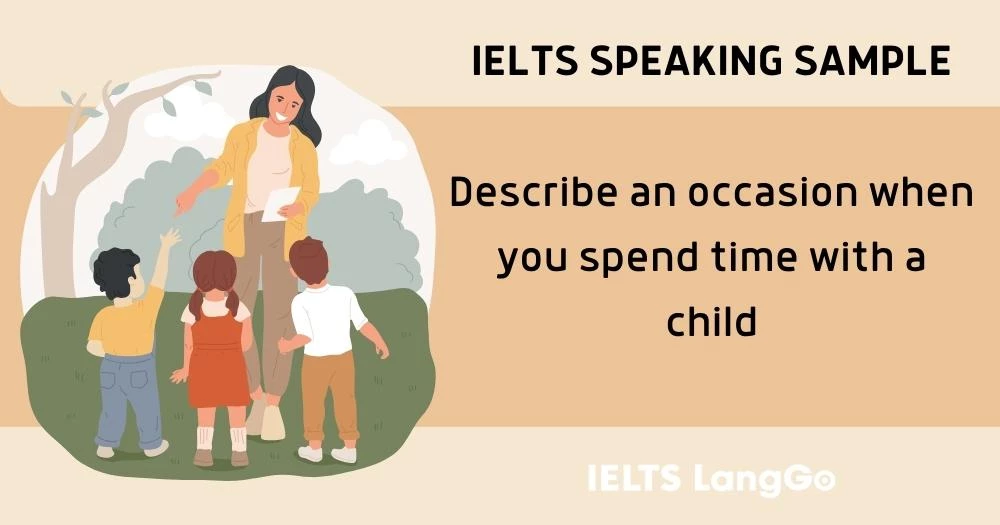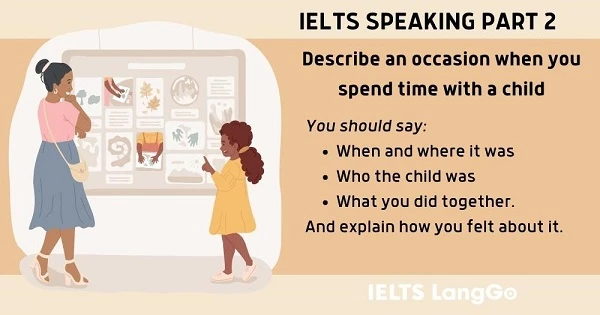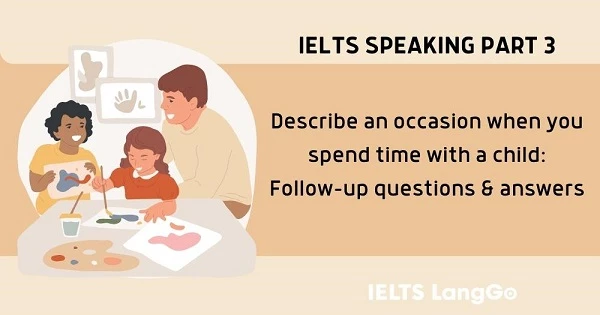


Describe an occasion when you spend time with a child là đề thi IELTS Speaking Part 2 mới xuất hiện trong đề thi thực tế gần đây. Để giúp các bạn chinh phục đề bài này, IELTS LangGo sẽ mang đến cho bạn 2 bài mẫu 7.5+ IELTS, đồng thời tổng hợp các follow-up questions thường gặp trong Part 3 kèm Sample Answer.
Tham khảo ngay và đừng quên note lại những cách diễn đạt hay và các từ vựng ăn điểm nhé!
Như các bạn đã biết, mở đầu Part 2, giám khảo sẽ đưa cho bạn 1 cue card (thẻ gợi ý) về chủ đề của bài nói. Dưới đây là cue card cho đề bài này:
Question: Describe an occasion/a time when you spend time with a child.
You should say:
And explain how you felt about it.
Sau khi nhận đề bài, bạn sẽ có khoảng 1 phút để chuẩn bị trước khi trình bày và lời khuyên cho bạn là hãy tận dụng 2 phút này thật tốt và bám sát các gợi ý trong cue card để lên ý tưởng cho bài nói Part 2.
Sau đây, chúng ta sẽ cùng tham khảo 2 bài mẫu cho đề bài: Describe an occasion when you spend time with a child nhé.
Sample Answer 1:
As a matter of fact, I am a person who adores spending time with kids. This is also a reason why I became a kindergarten teacher. I remember vividly an occasion that I had to babysit my niece when her parents went on a business trip which left unforgettable impressions on me.
If I remember correctly, it was on Saturday when I was still in bed, and I received a call from my sister-in-law to look after my 3-year-old daughter. At first I felt reluctant, because I didn't want to waste my day off running errands for a kid. But she said that there was nobody else who they could entrust their child to, so I couldn't turn her down.
At first, everything was under my control as I managed to keep my niece occupied for a while. We played hide-and-seek, built towers out of blocks, and we even read fairy tales together. She was absolutely an angel. However, this thing started to drain my energy after a while, so I asked my niece to play on her own. However, she demanded constant attention and refused to play by herself, and started to throw a tantrum.
As a last resort, I had to calm her down by letting her watch cartoons on my phone, so I can have some time to recharge my battery and take a small nap. However, after about 30 minutes, I would have to persuade her to play with me again, because I guess that staring at a phone for a while is not good for a child's eyes.
Truth to be told, although I love spending time with kids, I still struggle some time to take care of them and to find ways to keep them engaged with me. So I guess that in the future, I will have to read more books about parenting skills so that I can have better ways to play with a kid.
Vocabulary Highlight:

Sample Answer 2:
I have mentioned a few times here that I used to be a teaching assistant, for children aged 3 to 10. So my story will revolve around such a kid. Back then, I was a teaching assistant for a class in the Primary 1 level, so the children were only 6 or 7 years old.
And there was this one kid, who was actually very bright academically but did not put all of his prowess into appropriate tasks and instead always caused stir within every single lesson.
So on this one day, when everyone was lining up in order to play a word scrambling game - they were standing in two lines, this boy was showing signs of jumping the line and being disrespectful to his teammates in order to be just mischievous and be victorious out of the game.
I had observed him for a while throughout the lesson, and up to that point I decided that everything should stop. I brought him outside of the class and tried to talk to him in a very kind of intimidating and serious tone of voice in order for him to realise that this kind of behaviour was unacceptable within the class and he should stop.
I was furious enough for him to burst out crying and once we returned to the class, he did not speak anything until the class ended. And when it ended, he stayed by my side until his father came and he told me to bring him out to his parents.
So that was this experience when I spent time with a kid that I proved myself to be an effective controller, though a little violent and still very controlling. But I did something good for the whole collective in the end, and it has stuck in my memory ever since.
Vocabulary Highlight:
Theo cấu trúc đề thi IELTS, các câu hỏi trong Part 3 sẽ liên quan đến chủ đề của Part 2. Vì vậy, bên cạnh việc tham khảo 2 bài mẫu ở trên, các bạn cũng cần chuẩn bị cho các câu hỏi xoay quanh topic Children.
Dưới đây là một số follow up questions thường gặp kèm câu trả lời mẫu cho đề bài Describe an occasion when you spend time with a child.
Q1: At what age do you think children can be trusted to make their own
I don't think there is any specific age for this certain matter. It also depends on how big and serious the decisions are.
Therefore, I think that children can make their own choices at any age – as long as those decisions are made under controlled settings with proper parental guidance or when they demonstrate maturity.
For example, even at the age 5, they can make their own choice of clothing or how to do their daily routines. I do believe if parents grant more freedom for their children, chances are they will grow up into independent and responsible adults.
Vocabulary Highlight:
Q2: Do you think that parents today face different challenges than parents did in the past? Why or why not?
I think for the majority of parents, they do have the same set of problems and issues to deal with, regardless of which era or time they are in. However, in this day and age, modern parents are more burdened on the side of finance than ever. This stems from a few factors.
First of all, children nowadays have to be more well educated and have to undertake a wider variety of subjects and courses, in order for them to become independent, capable adults when they grow up. Moreover, the cost of living - especially in the cities - have always been rising year after year.
Nowadays, it is very hard and difficult for an average family to have their own house without having to rely on borrowed money or subsidies from the government. But on a more positive side, I think the number of children in today's families have reduced substantially, with just one, two or three - as opposed to more than five in the past.
That also relieves the problem of finance and work that parents have to do in order to make ends meet.
Vocabulary Highlight:

Q3: What do you think are some of the most important things that parents can do to help their children grow up to be responsible and successful adults?
I guess that parents can provide an environment of democracy in which children are allowed to raise their voices and opinions, so that they can feel respected and responsible for their own choices.
Along with that, parents should also provide proper guidance without being ‘helicopter parents” – who always impose restrictions on their kids: “They mustn’t do this. They mustn't do that”. I guess that we parents will have to balance between releasing the children to do their own thing and trying to give them guidance when they need it.
Vocabulary Highlight:
Q4: In your opinion, what are some of the most effective discipline techniques for children?
From my own observations, I think there are two techniques that prove successful when it comes to dealing with children.
First of all, it is communication. Obviously, it still applies to people of every single age group, not just young children. What does it mean? Parents need to at least listen to their children’s stories and thoughts in order to promptly acknowledge and realise the wants or needs of their offspring in order to follow up with subsequent steps or reactions for the understanding to be accurate, to be understandable and to be sympathetic.
Secondly, I think it’s more applied to very small ones, and that is a reward system. With every single thing children are expected to do, they also have some anticipation that they will receive something in return. For example, if they are required to do some chores, they can be returned with some treats, some sweets or good food from their parents, in exchange for their hard work and responsibilities.
Once they grow up, the level of reward can also change in order to adapt to the extent and intensity of the tasks that they are going through, and to show deeper and more serious attention of parents to how children earn knowledge, earn experiences and grow up to be a responsible adult, and will do all the same things to their own children.
Vocabulary Highlight:
Với 2 sample cho đề bài Describe an occasion when you spend time with a child và các câu trả lời mẫu cho các follow-up questions, IELTS LangGo tin rằng bạn đã có thể tự tin hơn khi gặp các câu hỏi Speaking về chủ đề này.
Các bạn hãy tự chuẩn bị những câu trả lời mang dấu ấn cá nhân của riêng bạn sau khi tham khảo các cách phát triển ý và từ vựng trong bài mẫu nhé.



ĐẶT LỊCH TƯ VẤN MIỄN PHÍ LỘ TRÌNH Săn ƯU ĐÃI lên tới 12.000.000đ